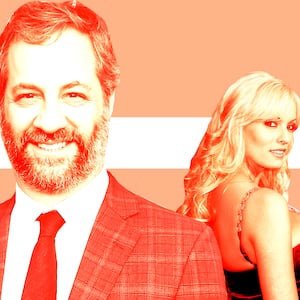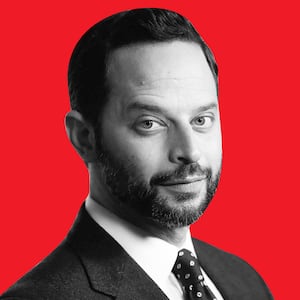Subscribe to The Last Laugh on Apple Podcasts
Nearly every single magazine profile of Judd Apatow over the past decade and a half begins by calling him a hoarder. But when I visit his unassuming Los Angeles office to record this week’s episode of The Last Laugh podcast, it is atypically clutter-free.
“I just put everything in storage,” Apatow tells me. “I’m such a hoarder that I can’t throw anything out, but now everything is in storage.” He adds, “It’s nice to have fresh space to hoard.”
It wasn’t until after comedian Garry Shandling died suddenly of a heart attack in 2016 that Apatow realized his friend and mentor had a similar compulsion.
“Garry always seemed like someone who was living in the present, not attached to the past, but he didn’t throw anything out,” Apatow explains. When he went to help clean out Shandling’s house after his death, he uncovered troves of journals, photos and comedy writing that now have a permanent home in his new book.
It’s Garry Shandling’s Book is an even deeper dive into the comedian’s life and career than the four-hour documentary Apatow made for HBO last year called The Zen Diaries of Garry Shandling, which included not only excerpts from Shandling’s journals but also interviews with comedians who revered him just as much as he does.
“When you make a documentary, sometimes you have to use two lines from Conan O’Brien to establish the sequence, but the truth is we talked for hours,” Apatow reveals. “And with the book, I could show long hunks of conversation and go deeper into people’s stories and descriptions of Garry. And then there was just all this weird, funny stuff that I found. And as a hoarder, I’d like this to exist in a way that people could look at it forever, because his journey is so interesting as a man and a comedy mind.”
Since finishing the book, Apatow has been hard at work on editing his next, still untitled film, which was co-written by and stars Saturday Night Live cast member Pete Davidson. Apatow describes the film, which is a fictionalized version of Davidson’s real story, as a “drama with comedy” that deals with “grief and how it affects you throughout your life.”
They first met when Apatow cast a pre-SNL, 19-year-old Davidson in a brief cameo in 2015’s Trainwreck on star Amy Schumer’s recommendation. “This is gonna be the guy,” Schumer told him before anyone really knew who Davidson was. Apatow jokes that he wanted to cast him in that film “mainly just so we could say we were smart enough to put him in before anybody else.”
Over the course of our wide-ranging conversation, Apatow talks about getting his first big break from Shandling and passing on that spirit of mentorship to younger comics like Schumer and Davidson, along with Lena Dunham, Pete Holmes and many others. We also get into thornier topics currently swirling around the comedy community including why he decided to speak out against Louis C.K. for making jokes at the expense of the Parkland shooting survivors.
Highlights from our conversation are below and you can listen to the whole thing right now by subscribing to The Last Laugh on Apple Podcasts, the Himalaya app or wherever you listen to podcasts.
What he learned from reading Garry Shandling’s journals
“The thing I was most surprised by was, in his journals, he was mainly trying to say kind things to himself. He was repeating different Buddhist ideas to reinforce the healthy part of his mind. My journals are just me whining like a bitch for thousands of pages. It doesn’t really reflect how I feel, it’s trying to get a voice out of my head. I think Garry always had that voice in his head and the journal was the voice responding to it. Saying, this isn’t important, you have to drop your ego, just focus on love and kindness. It was his way of almost hypnotizing himself; of absorbing these ideas into his psyche. So over 30 years of journals, there are very few pages that are rants against people, and I found that to be shocking and inspiring that he had this methodical approach to keeping sane.”
On working with SNL’s Pete Davidson on his upcoming film
“It’s a real dream come true to get to collaborate with Pete. Because the material is very emotional, I wasn’t sure what I was about to put Pete through. He was ridiculously professional and energetic. And how I know it went well is, I’m sitting in editing and watching all the takes and all the choices Pete made and I’m just blown away by how creative he is. And how brave he is to dig deep in his psyche and his emotions and his past for both dramatic and comedic material. He’s always been very honest. He has a very hilarious, dark sense of humor and that’s the filter with which he sees the world. He’s also very courageous in talking about his feelings and his struggles. He would say things in the middle of a take that I would never have thought of in a million years. Sometimes it was wild stuff, much darker than I would have thought to go, but if that’s what occurred to him in the moment then it must be correct because it’s coming from his psyche. It’s a bit like a Nic Cage-type performance—there’s something wonderfully deep and emotional and sometimes unhinged about it.”
On telling jokes about Bill Cosby on ‘The Tonight Show’
“I had a bit about Cosby trying to hide the paper from [his wife] Camille so she wouldn’t find out [about his rape allegations]. And I wound up doing that on The Tonight Show. They asked me if I wanted to do stand-up, and I always felt like they asked me just as a goof, because if I bombed it would probably be just as amusing as if I did well. So no one at the show even asked me what I was going to say. Usually they really grind the comedians to work on the set. And I had been doing this Cosby bit but I was not going to do it on The Tonight Show because it was a very dark piece of comedy. And so I would run my set at the [Comedy] Cellar and after that I would do other material and one of the bits was this Cosby bit. And every comedian was like, you have to do that on The Tonight Show and I kept saying, you can’t do that on The Tonight Show. Then I could tell that was the move to make, which was scary and I wound up doing it and was lucky it went well.”
On Louis C.K.’s jokes making fun of the Parkland school shooting survivors
“I did feel like his jokes were especially offensive, because those were underage kids and they have suffered in a way that no one can ever understand. And there’s a real risk of them losing their lives to suicide. And so piling on and making them the object of ridicule felt so off. That being said, I’m all for Louis working on his act. I don’t think he should be denied the ability to do what he does and he’ll figure out his path in deciding what the next stage of his creative life is. But I do think that comedians should be criticized. It’s an art form and a lot of comedians say, ‘I’m not done yet! Criticize me when I have the finished set.’ I don’t know, people are paying money, so if someone paid money, they’re allowed to have an opinion on what they just saw. I don’t necessarily think that’s a bad thing. If I make a movie, people are allowed to trash it. And it’s a little disingenuous to think that comedians, who criticize everybody, should not be the subject of criticism. And I want comedians to be kind-hearted and I want comedians to stand for something good generally. But some comedy is just meant to be dark and awful and some people really enjoy that. They like when people just say the worst thing you could ever say. I understand there’s a release to that and I enjoy that. But I felt like with the Parkland kids, they’re real. We know their names. And yes, you’re allowed to do it. But we’re allowed to say, I don’t like that you did it.”
Next week on The Last Laugh podcast: Stand-up comedian and star of Curb Your Enthusiasm and The Goldbergs, Jeff Garlin.








